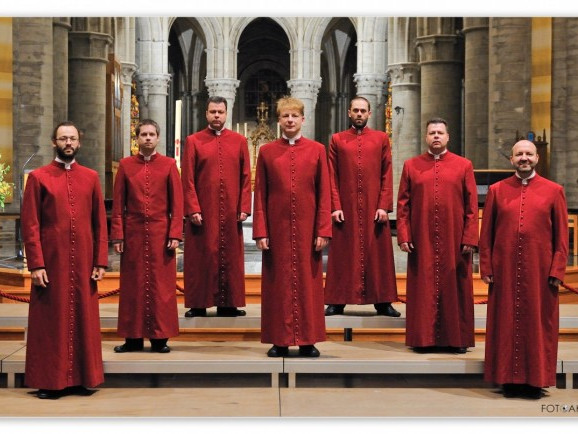
Schola Cantorum Riga
The Schola Cantorum Riga vocal group was founded in 1995 with the goal of focusing on the authentic interpretation of early music, especially Gregorian chant. The singers are professional musicians who share a love for early music and wish to perform it according to the newest findings in the field of historically informed performance.
Over the past two and a half decades, the group’s repertoire has not only grown but also become more diverse. In addition to medieval music, its concerts and recordings now sometimes also include works by contemporary Latvian composers as well as premieres of those works. Schola Cantorum Riga has collaborated with composers Nic Gotham, Renāte Stivriņa, Valts Pūce, Raimonds Tiguls and others, but particularly often with Rihards Dubra.
In its desire to shape their concerts as a musical dialogue between various centuries, eras and musical experiences, Schola Cantorum Riga often invites guest musicians to join it on a variety of instruments. The group has partnered with organists Kristīne Adamaite, Diāna Jaunzeme-Portnaja and Aigars Reinis, percussionists Rihards Zaļupe and Ivars Kalniņš, saxophonist Gints Pabērzs and others. The group’s founder and director, Guntars Prānis, also accompanies the singers on hurdy-gurdy.
Schola Cantorum Riga most often performs at Riga Cathedral, where it also frequently participates in services, and all of its recordings to date have been made in the special acoustic environment of Riga Cathedral. However, the group also performs at other venues throughout Latvia, in cities as well as small rural churches (Liepāja, Venstpils, Jelgava, Balvi, Tukums, Sāti, Gārsene, Skrunda, Cēsis, etc.). Many of these performances take place in the form of concert-lectures, with Prānis telling about early music in general as well as the specific concert programme.
Schola Cantorum Riga has participated in early music festivals in Latvia and abroad, including Gregorian Week in Riga, the International Gregorian Festival of Watou (Belgium), the Gaude Mater festival in Częstochowa and the Płock Sadred Mucic Festival (Poland). The group has also performed in Italy, Switzerland, Germany, Austria, France, Norway, Finland and Estonia.
Schola Cantorum Riga has recorded several albums featuring Gregorian chant as well as Ambrosian hymns and early examples of polyphony. It received the Annual Latvian Music Recording Industry Award for its album Riga Mass, and in 2016, the group was nominated for the Latvian Grand Music Award for outstanding performance throughout the year.
Regarding the group’s work on its album Domus Mea released by the national record label Skani, Prānis has commented: “The goal of this album was to document and present to a broader audience the as yet little-known medieval chants of Riga Cathedral, with which written Latvian music history begins.”
LMIC 2020
